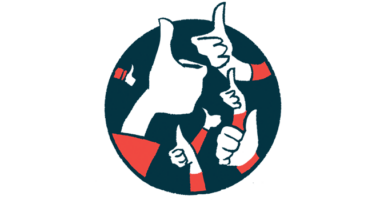Pressure-Treated Yeast Fiber Compounds May Benefit IPF Patients

An inhalable therapeutic is being developed using pressure-treated yeast beta-glucan for people with COVID-19 as well as other severe lung diseases, including idiopathic pulmonary fibrosis (IPF). Beta-glucans are fiber compounds that are naturally found in the cell walls of grains, bacteria, and fungi, such as yeast.
Ceapro, a biotechnology company based in Alberta, Canada, uses its patented Pressurized Gas eXpanded (PGX) technology to transform beta-glucans into highly soluble dry microparticles or free-flowing powders with adjustable particle sizes.
Ceapro began collaborating with researchers at McMaster University in Canada in 2019 to use PGX-treated beta-glucans (PGX-YBG) to develop inhalable delivery systems to optimize formulations for therapies meant to treat chronic diseases, such as IPF. PGX-YBG particles have unique aerodynamic properties that let them be inhaled deep in the lungs, where tissue scarring (fibrosis) occurs.
Preliminary experiments with PGX-YBG alone, or combined with a medicine, however, showed PGX-YBG was able to modulate immune responses and work as an active component in an anti-fibrotic treatment, rather than simply serve as a carrier.
“We have shown that the PGX technology can convert materials that can’t easily be inhaled, in particular, a YBG-based particle that has inherent immunomodulatory properties, into materials that can readily access the lung,” Todd Hoare, PhD, from McMaster’s department of chemical engineering, said in a press release.
“Combining this property with the very high internal surface area of the PGX-processed microparticles that enables high-concentration drug loading using Ceapro’s supercritical drug impregnation process, we are very excited about the potential of this technology for treating diseases of the lung,” he added.
In IPF, excessive scar tissue formation leads to stiffening and hardening of lung tissues, making it difficult for patients to breathe. Recent studies have shown that lung fibrosis can also occur and persist for months in some COVID-19 patients.
Evidence suggests that certain immune cells known as M2-like macrophages remain in the fibrotic lungs and release cell-signaling molecules that stimulate other cells to constantly generate and deposit scar tissue.
Additional experiments have indicated that PGX-YBG selectively binds to a protein receptor, Dectin-1, found on the surface of macrophages. This binding event reprograms M2-like cells into M1-like macrophages that no longer release pro-fibrotic signaling molecules, initiating the removal of excess tissue.
“We have shown, in vitro, that PGX-YBG have the ability to prevent the activation of macrophages toward a pro-fibrotic [behavior]. In addition, PGX-YBG treatment to macrophages that have already acquired a pro-fibrotic [behavior] results in the reprogramming of the macrophages toward a classical [behavior] not known to be pro-fibrotic,” said Kjetil Ask, PhD, a pulmonary fibrosis expert at McMaster.
“Using cells from animals lacking the beta-glucan receptor Dectin-1, we showed that this was dependent on the presence of the Dectin-1 receptor, “ Ask added. “These findings are very exciting as macrophage reprogramming is seen as a viable therapeutic strategy toward fibrotic disease and PGX-YBG seem to have this ability.”
PGX-YBG was also found to be safe when given to mice, and preliminary data suggested it was able to halt pro-fibrotic processes in an experimental animal model of lung fibrosis. According to Ask, the team is now working to validate these findings.
In advance of of potential trials in people, scientists at Ceapro are working to optimize the delivery of PGX-YBG to the lungs and further validate PGX-YBG’s ability to reduce lung fibrosis, both alone and when loaded with anti-inflammatory therapies.
“We are very pleased with the progress made in this research project … [and] we believe it certainly becomes necessary to conduct additional animal studies before initiating human trials to develop the best possible tool in the fight against lung fibrotic diseases,” said Gilles Gagnon, president and CEO of Ceapro.
“We are thankful for the collaborative work with the team at McMaster University and look forward to further development,” Gagnon added.








